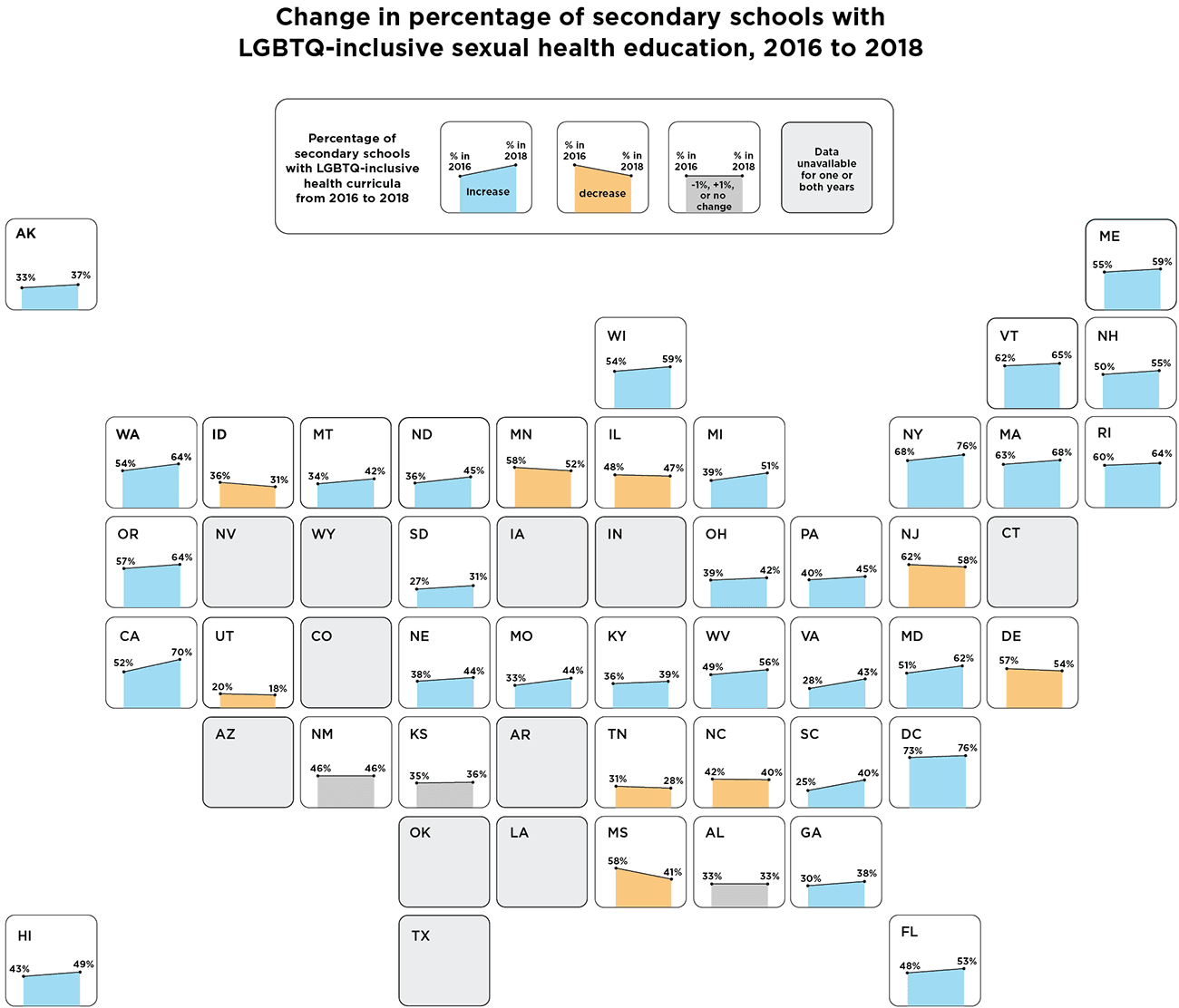Only 17 States and DC Report LGBTQ-Inclusive Sex Ed Curricula in at Least Half of Schools, Despite Recent Increases
A Child Trends analysis of data for 39 states and the District of Columbia, from the Centers for Disease Control and Prevention (CDC), found that, in 2018, more than half of secondary schools in 17 states and the District of Columbia reported offering sex-ed curricula or supplementary materials relevant to lesbian, gay, bisexual, transgender, queer, and/or questioning (LGBTQ) students.
From 2016 to 2018, 27 states and the District of Columbia reported increases of greater than one percentage point in the percentage of schools offering sex-ed materials that are inclusive of LGBTQ youth. Most markedly, seven states (California, Maryland, Michigan, Missouri, South Carolina, Virginia, and Washington) reported an increase of 10 or more percentage points in the number of secondary schools offering LGBTQ-inclusive sex-ed curricula. Only one state (Mississippi) saw a drastic decline in the percentage of secondary schools that reported offering LGBTQ-inclusive sex-ed curricula (a 17 percentage-point decrease).

Note: The CDC measures change in the percentage of schools that provide curricula or supplementary materials that include HIV, STD, or pregnancy prevention information that is relevant to LGBTQ youth (e.g., curricula or materials that use inclusive language or terminology).
Sources: Centers for Disease Control and Prevention. (2019). School Health Profiles 2018: Characteristics of Health Programs Among Secondary Schools. Centers for Disease Control and Prevention.
Centers for Disease Control and Prevention. (2017). School Health Profiles 2016: Characteristics of Health Programs Among Secondary Schools. Centers for Disease Control and Prevention.
The policy landscape around inclusive sexual education continues to change quickly. As of 2020, six states (California, Colorado, New Jersey, Oregon, Rhode Island, and Washington) plus the District of Columbia explicitly require inclusive sex-ed curricula. While Alabama, Arizona, and South Carolina recently repealed anti-LGBTQ policies through legislation or court decisions, other states—including Florida, North Carolina, and Oklahoma—had anti-LGBTQ policies related to sex-ed as recently as 2019.
Anti-LGBTQ policies can exacerbate stigma and result in negative mental health outcomes for youth. Experiences of stigma related to sexual orientation and gender identity have been linked to an increased risk of involvement in a pregnancy (i.e., becoming pregnant or getting someone pregnant) and higher rates of dating violence among LGBTQ youth. Experiences of stigma have also been associated with drug use and alcohol use among LGBTQ youth, factors that can increase the risk of engaging in risky sexual behaviors.
Access to sexual health education that is inclusive of LGBTQ youth is associated with improved health and reduced impacts from LGBTQ stigma among LGBTQ youth—including reductions in risky sexual behavior, lower risk of depression, and fewer reports of bullying—as well as reduced suicidal thoughts among both straight, cisgender youth and LGBTQ youth. Characteristics of inclusive sex-ed include the provision of information that explicitly addresses the needs of LGBTQ youth as a part of education about HIV, STDs, and pregnancy prevention; the use of inclusive, non-gendered language; and examples of healthy, non-heterosexual relationships.
This blog updates our June 2019 analysis with the most recent data, from 2018.
Series
- Only 9 States and DC Report That More Than Half of Secondary Schools Have a Gender and Sexuality Alliance
- Schools Can Reduce Barriers to Mental Health Access by Ensuring That Services Are Supportive of LGBTQ Youth
- State-level Data Show Schools Can Facilitate LGBTQ Students’ Access to Relevant Physical Health Services
© Copyright 2024 ChildTrendsPrivacy Statement
Newsletter SignupLinkedInThreadsYouTube